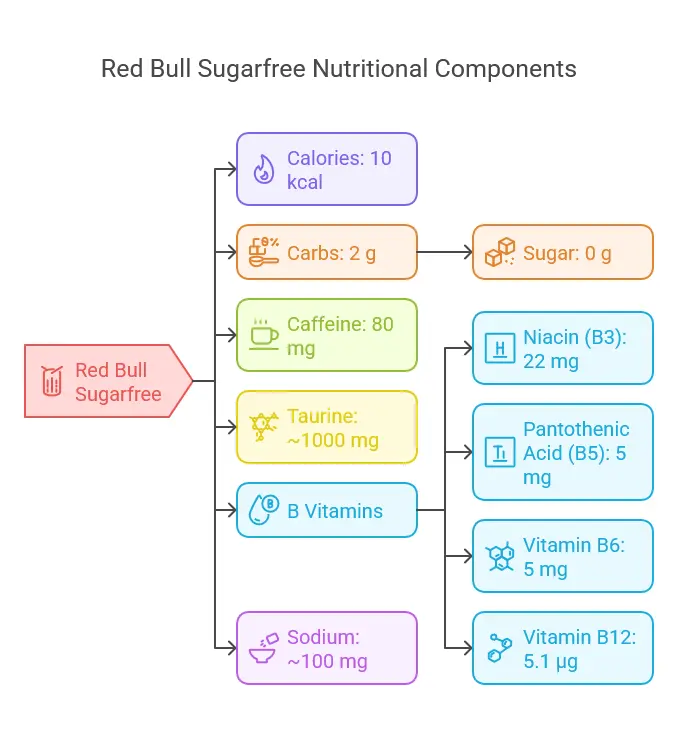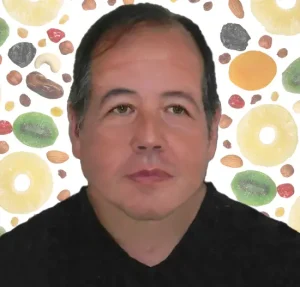Red Bull Sugarfree promises the same “wings” as the original minus the sugar crash—sounds like a win, right? But is it truly a healthier buzz, or just another slick can of overhyped promises? Let’s rip into the nutrition, scrutinize the ingredients, cut through the BS, and decide if it’s fit for a “healthy” vending machine—or if you’re better off elsewhere.
Nutritional Breakdown:
Low Cal, Same Kick, B-Vitamin Bonanza
An 8.4 oz (250 ml) can of Red Bull Sugarfree packs:
- Calories: 10 kcal (trace carbs, no sugar)
- Sugar: 0 g (swapped for sweeteners)
- Carbs: 2 g (from sweeteners, minimal impact)
- Caffeine: 80 mg (same as Original)
- Taurine: ~1000 mg (standard estimate, not specified)
- B Vitamins:
- Niacin (B3): 22 mg (157% DV)
- Pantothenic Acid (B5): 5 mg (100% DV)
- Vitamin B6: 5 mg (294% DV)
- Vitamin B12: 5.1 µg (214% DV)
- Sodium: ~100 mg (not always listed, varies by region, ~4% DV)

Compared to Red Bull Original (112 kcal, 27 g sugar), Sugarfree’s a featherweight—10 kcal and zero sugar slash the calorie bomb. Caffeine holds steady at 80 mg, a mild, proven jolt (Journal of Psychopharmacology, 2010). The B vitamins are identical—wildly high (294% B6, 214% B12), flexing hard for that “energy metabolism” claim. They’re water-soluble, so excess flushes out—no harm, per Nutrients (2019), but no real perk unless you’re starving for Bs. Sodium’s low, negligible. The 2 g carbs come from sweeteners—negligible blood sugar hit. So far, it’s leaner than Original, but those vitamins still smell like a marketing stunt.
Ingredients: Synthetic Swap Shop
Red Bull Sugarfree’s lineup (U.S. version):
- Carbonated Water: Natural, bubbly baseline.
- Citric Acid: Likely synthetic, fermented industrially. Safe, tart.
- Taurine: Lab-made amino acid, not from bulls. GRAS by FDA, benefits unproven (Frontiers in Physiology, 2018).
- Sodium Citrate: Synthetic buffer, citric acid’s cousin.
- Caffeine: Natural (coffee/tea) or synthetic—Red Bull’s coy. Same effect either way.
- Acesulfame Potassium & Sucralose: Artificial sweeteners, zero calories, lab-born. FDA-approved, but not “natural.”
- Niacinamide (B3), Calcium Pantothenate (B5), Pyridoxine HCl (B6), Vitamin B12: Synthetic vitamins, lab-crafted for punch.
- Natural and Artificial Flavors: Murky mix—some plant extracts, some chemical wizardry. No specifics.
- Colors: Minimal (often none in U.S.), possibly caramelized sugar.
Ditching sugar (sucrose, glucose) for acesulfame K and sucralose keeps it light, but ramps up the synthetic count. Taurine, B vitamins, and flavorings were already lab-made in Original; now sweeteners join the party. It’s a clean break from nature—safe, sure, but a far cry from wholesome.
Calling Out the Hype
Red Bull Sugarfree touts “vitalizes body and mind” without sugar—half the pitch holds. The 80 mg caffeine delivers a legit lift, no crash attached—solid for a deadline or drive. But taurine? Same old story—1000 mg sounds cool, yet evidence for energy or performance perks is flimsy. Those B vitamins? A dazzling 294% DV (B6) looks impressive, but unless you’re deficient, it’s just expensive pee. The zero-sugar swap is the real win—dodges Original’s 27 g gut punch and 112 kcal load. Still, Mayo Clinic Proceedings (2017) links energy drinks to blood pressure ticks—80 mg caffeine plus taurine might nudge that. Sweeteners? EFSA (2011) says safe, but some balk at the aftertaste or rare gut gripes. It’s cleaner than Original, but “vitalizing” feels more like caffeine doing the heavy lifting, not some magic blend.
Smarter Choices
Why settle? Black coffee: 80 mg caffeine, zero sugar, no lab frills. Green tea: gentler buzz, antioxidants, natural vibe. Water with electrolytes: pure hydration, no synthetics. Want a canned fix? Monster Zero Ultra (140 mg caffeine) packs more punch, same zero-sugar play. A banana? Natural B6, carbs, no aftertaste. Sugarfree’s not poison, but it’s not a health hero either.
Vending Machine Verdict: Green Light, With Caveats
For a “healthy” vending machine, Red Bull Sugarfree clears the bar—barely. Zero sugar and 10 kcal crush Original’s 27 g/112 kcal disaster, and 80 mg caffeine’s tame enough for most (EFSA caps daily safe intake at 400 mg). The synthetic pile—acesulfame K, sucralose, taurine, B vitamins—dulls the “healthy” shine, but it’s not a dealbreaker. We stock it for energy seekers, not purists—we label it “low-cal buzz, not wellness.” Coffee (like Starbucks Nitro Cold Brew) or tea (such as Pure Leaf Unsweetened Iced Green Tea) still wins for clean simplicity (Deep Dives coming soon!). Readers, need wings? This’ll do, but smarter picks soar higher.


